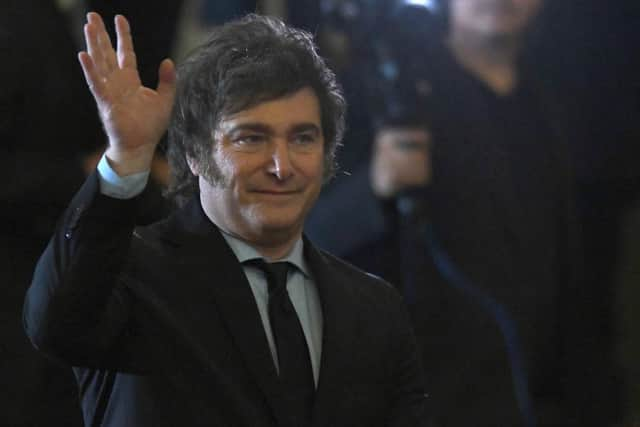Argentinian presidential elections: Who is Javier Miliei and what measures has he already taken to boost Argentina's failing economy in his first week in power?
Who is Javier Miliei?
An economist and author, the colourful Javier Milei has a host of other more unusual pursuits behind him, including a stint in a Rolling Stones cover band and a period as a goalkeeper for the Chacarita Juniors association football team.
He quit football for economics in 1989, during a period of hyperinflation in Argentina. His interest in economics was reportedly piqued as a teenager in the early 1980s, at the time of the collapse of Argentina's exchange rate.
Advertisement
Hide AdAdvertisement
Hide Ad

As an economist, he has taught university courses in macroeconomics, economic growth and microeconomics. He was also a senior economist at HSBC Argentina and held the role of chief economist at a number of public bodies.
Regular, controversial appearances on TV debates about the economy and politics shot him into the public domain both domestically and internationally.
Initially moving into politics in 2020, when he was a member of Avanza Libertad (Freedom Advances), he a year later established the coalition La Libertad Avanza (Freedom Moves Forward) which secured third place in primary elections and in the 2021 Argentine legislative election. He was elected into the Chamber of Deputies and ran for the presidential election under the Libertarian party, and was sworn in as president on Sunday.
Sometimes likened to far-right Hungarian president Viktor Orban, former US president Donald Trump and former Brazilian president Jair Bolsonaro, Mr Milei has run for president on a ticket of restricting abortion rights, liberalising gun laws and climate change denial.
During the campaign, he has said he will replace Argentina's currency with the dollar, abolish the country's central bank and get rid of a swathe of government departments he deems to be unnecessary. On his first day in power, he had already signed a decree to reduce the number of departments from 18 to nine.
What is wrong with Argentina’s economy?
The country’s economy has gone through boom-bust cycles for decades and governments have turned to money printing to fund debts, which has sent inflation higher and has weakened the currency, the peso. It has been in recession more since the 1950s than almost any other country in the world.
Argentina's net foreign currency reserves are estimated to be $10 billion in the red and capital controls skew the exchange rate.
Inflation is currently running at 140 per cent – and rising - and poverty is at 40 per cent. Economists say Argentina is on the brink of a deep recession.
Advertisement
Hide AdAdvertisement
Hide AdBank financing is rare in Argentina and most people who want to own a home have to buy their properties outright, using cash.
What are Mr Milei’s plans to fix it?
Mr Milei has already moved to weaken the value of Argentinian currency, the Peso, by more than 50 per cent against the US dollar in a bid to stave off hyperinflation.
His economy minister, Luis Caputo, also announced deep cuts to public spending, including a reduction in fuel and transport subsidies and freezing spending on some major government contracts and advertising.
Mr Milei said on taking office earlier this week that he would implement a period of strict austerity, which he says is in contrast to "decades of decadence".
He hopes to cut public debts and reduce inflation.
"The bottom line is that there is no alternative to austerity and there is no alternative to shock treatment," Mr Milei said.
"We know that in the short term the situation will worsen. But then we will see the fruits of our efforts."
Comments
Want to join the conversation? Please or to comment on this article.
